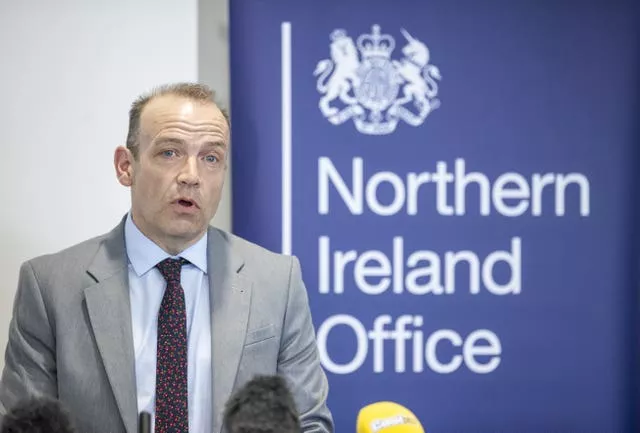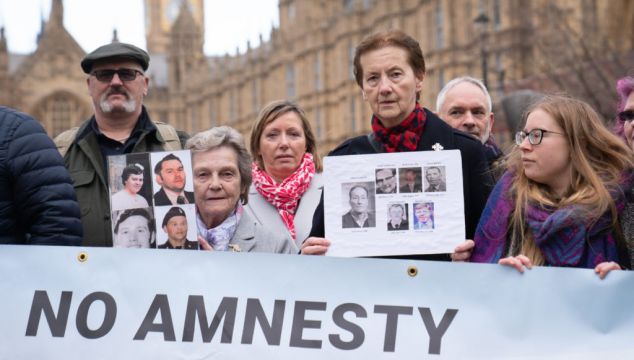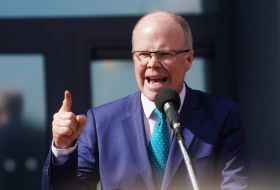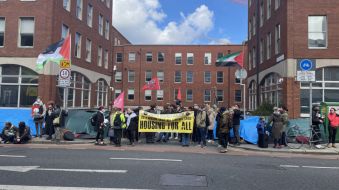The UK Government has overturned attempts to remove the conditional immunity provision from legislation designed to deal with the legacy of the Northern Ireland Troubles.
The House of Lords had voted to strip out the contentious element which aims to offer immunity from prosecution to those who committed crimes during the Troubles if they co-operate with a new truth-recovery body.
Critics of the measures said it would benefit “terrorists more than their victims”.

But MPs voted 292 to 200, majority 92, to disagree with this change and to restore the measures to the Northern Ireland Troubles (Legacy and Reconciliation) Bill.
The Bill will now return to the House of Lords for further consideration, with the Government hoping it becomes law before the start of the summer recess on Thursday.
The proposed law also seeks to halt future civil cases and inquests linked to killings during the conflict, and would allow the Independent Commission for Reconciliation and Information Recovery (ICRIR) to take over hundreds of unresolved Troubles cases.
Despite the Government introducing a string of amendments to the Bill, it remains widely opposed by political parties, the Irish Government and victims’ groups.
Northern Ireland Secretary Chris Heaton-Harris said the legislation contains “finely balanced political and moral choices that are uncomfortable for many”.
He told MPs: “But we should be honest about what we can realistically deliver for the people in Northern Ireland in circumstances where the prospects of achieving justice in the traditional sense are so vanishingly small.
“This Bill seeks to deliver an approach that focuses on what can be practically achieved to deliver better outcomes for all those who suffered, including those who served, and aims to help society to look forward together to a more shared future.”
Mr Heaton-Harris also said: “Conditional immunity is a crucial aspect of the information recovery process and this Government believes it is the best mechanism by which we can generate the greatest volume of information in the quickest possible time to pass on to families and victims who have been waiting for so long.”
Conservative former minister Mark Francois said of the Bill: “I fear that some of the Government’s own amendments introduced in the Lords have had the effect of swinging the pendulum too far, in what I admit is a delicate balance, against our veterans who served in Operation Banner in Northern Ireland.”
Shadow Northern Ireland secretary Peter Kyle said the Bill “benefits terrorists more than their victims”, adding the Lords had sought to address this “flaw” by removing the immunity clause.
DUP leader Jeffrey Donaldson said: “We do need change. We need a system that can deliver. But surely it’s the victims that should have the choice, it surely should be down to the families to choose if they want to pursue justice or information.
“And when we deny them that route, when we take away the access to justice, in my opinion we actually diminish the prospect of achieving the second objective of this Bill, which is reconciliation.”
DUP MP Gavin Robinson (Belfast East) said: “The ability to offer immunity to terrorists, the ability to ensure they never face justice for their crimes, the subsequent ability to then talk openly and freely about their exploits, as those who have already been convicted do, it is not as if we need a crystal ball to guess that people who are unencumbered by the criminal justice system will have the freedom not only to share their experience but to torment their victims and their loved ones further.”
The DUP’s Jim Shannon (Strangford) could not hold back his tears while advocating for justice on behalf of his cousin Kenneth Smyth, who lost his life at the hands of the IRA.
Ahead of the debate, Northern Ireland Veterans Commissioner Danny Kinahan told the BBC he is giving a guarded welcome to the legislation because of the “lopsided” number of prosecutions against former members of the armed forces.
But victims campaigner Raymond McCord, whose son was murdered by loyalists during the Troubles, said: “The Irish Government, US government and the EU need to step up and not only condemn this shameful destruction of justice but take action against it.
“Be it through the courts in Strasbourg or a refusal of any trade deal, it’s clear just words are not enough.
“The families and victims not only deserve justice – they are entitled to it under British and international law.”







